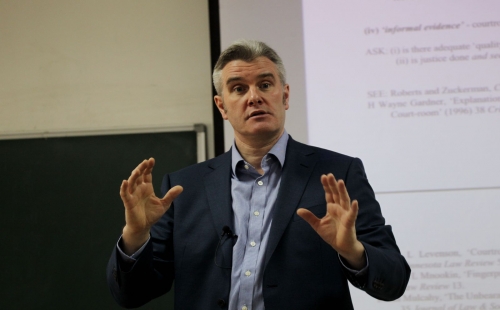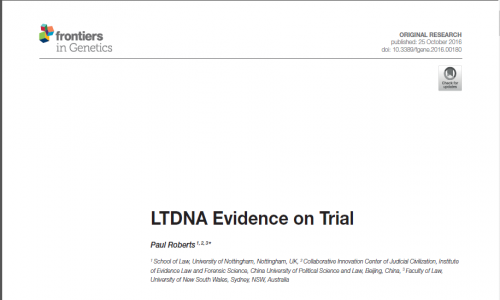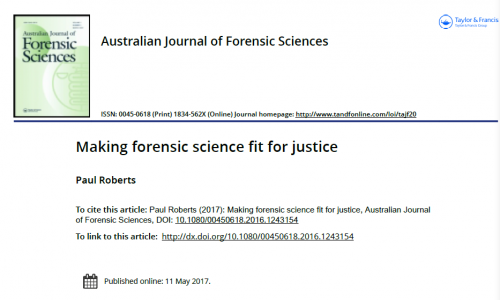In October 2016, professor Paul Roberts, a research fellow of “2011 Plan” China Collaborative Innovation Center of Judicial Civilization (“CICJC”) – China University of Political Science and Law (“CUPL”), as well as a professor in the University of Nottingham School of Law (UK) and the University of New South Wales, (NSW, Australia), published an article on topic of LTDNA Evidence on Trial in the journal of Frontiers in Genetics. And recently, professor Paul Roberts published another article on topic of Making Forensic Science Fit for Justice in Australian Journal of Forensic Sciences on 11 May 2017. Professor Paul Roberts introduces himself as an adjunct professor of law in CICJC – CUPL in both papers.

Frontiers is a community-rooted, open-access academic publisher, its grand vision is to build an Open Science platform where everybody has equal opportunity to seek, share and generate knowledge. Frontiers builds journals around research communities in specific fields and specialties and publishes articles that are scientifically correct and rigorously peer-reviewed. An analysis of open-access journal performance in the 2015 Journal Citation Reports (JCR) revealed that Frontiers journals generated the #1 highest number of citations in the categories of Psychology, Neurosciences, Plant Sciences, Immunology, Neurology and Physiology and the #2 highest number of citations in the categories of Pharmacology & Pharmacy and Microbiology. Adopting the interpretative/hermeneutical method typical of much legal scholarship, the article published in Frontiers in Genetics LTDNA Evidence on Trial considers two sets of issues pertaining to LTDNA profiles as evidence in criminal proceedings.

Australian Journal of Forensic Sciences (“AJFS”), founded in 1967 by the late Dr Oscar R Schmalzbach OBE, aims to bring together learned individuals from the broad areas of the law, medicine and science who are interested in the forensic application of their disciplines, is the official publication of the Australian Academy of Forensic Sciences. The Editorial policy is to attempt to represent the law, medicine and science and to promote active discussions of the relevant issues of the time as they affect the professional practice of the forensic sciences. The Journal is not restricted to contributions only from Australian authors but it will attempt to represent issues of particular relevance to Australia and its region. The article published in AJFS, Making Forensic Science Fit for Justice, presents a theoretically sophisticated but practically-orientated overview of the challenges of making forensic science “fit for” the administration of criminal justice.

Beyond his role as an adjunct professor of CICJC-China, Professor Paul Roberts is also an overseas key member of the “111 Plan” China Base for Evidence Science Innovation and Talent Recruitment and a member of the Advisory Committee of Foreign Experts, CUPL Key Laboratory of Evidence Science. Since 2013, Professor Paul Roberts taught law at the Institute of Evidence Law and Forensic Science of CUPL every year for a two credits course, introducing criminal evidence and forensic science from English common law perspective as well as comparative perspective for undergraduates, graduates and PhD students of CUPL.